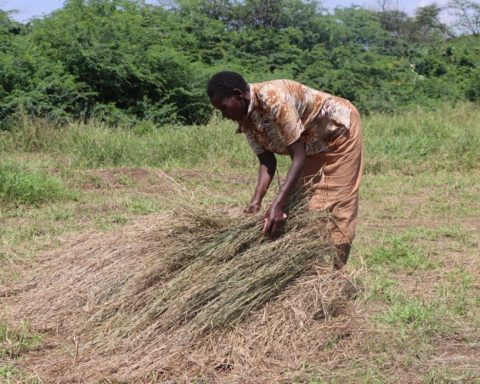The narrative surrounding plant-based diets often centres on Western experiences, inadvertently sidelining the rich, diverse culinary traditions of other regions. It’s an oversight that becomes increasingly significant against the backdrop of demographic shifts predicting that by 2050, one in four people on the planet will be African.
While demand for beef, chicken and pork are on the rise on the continent, Africans consumed just 9.6 kilograms of meat per capita from 2020 to 2022 compared to North Americans’ 78.6 kilos. Grains like millet and maize form the backbone of African cuisine, but they merely hint at the continent’s diverse culinary landscape. Take Nigeria, where okra, fufu (made from yam or cassava) and vibrant leafy greens like ewedu and spinach grace daily meals. In Ethiopia, teff injera, a gluten-free flatbread, pairs with lentil-based stews (wats) bursting with vegetables, while Kenyan ugali (cornmeal porridge) is served with sukuma wiki greens and indigenous fruits like tamarind and baobab. These food cultures, intricately connected with geography, climate and tradition, showcase the ingenuity and adaptability of African communities.
Deep cultural and spiritual threads are woven into the fabric of plant-based diets in many African nations. Abstaining from certain foods serves as ritual cleansing, ancestor veneration or a way to strengthen community bonds. It underscores the profound connection between food, faith and cultural identity in many African communities. Understanding these nuances is crucial as Africa’s food systems evolve.
Parallel to this, in the United States, African American women have emerged as leading voices in the vegan movement, illustrating a profound and transformative cultural shift. A 2015 Harris Poll survey found that 8% of Black respondents were vegetarian or vegan, while that was true for just 3% of the overall population. This movement is not merely a dietary trend but a significant cultural renaissance, echoing a broader historical narrative in which African American dietary customs, shaped under the harsh conditions of slavery, resulted in soul food that originally comprised scraps from the slave owners’ tables, fried to make them more palatable.
Today African American women are also leading a wave of plant-based start-ups and restaurants, such as Samantha Edwards’s New Breed Meats, with offerings like plant-based jerk chicken. More than just a dietary trend, Afro-veganism and African American veganism are vibrant movements that celebrate a plant-based diet’s cultural depth, ecological wisdom and culinary creativity. These movements are not just about choosing plant-based foods but about reclaiming and redefining African American food traditions.
Moreover, these dietary shifts are intertwined with broader discussions about food sovereignty, access to healthy foods in Black neighbourhoods and the environmental impact of food choices. Afro-veganism and African American veganism advocate for a more equitable food system that honours the planet and its people.
The challenges of expanding the plant-based economy in Africa – ranging from fragile infrastructure and food spoilage to deep-seated cultural preferences for animal protein – have spurred innovative solutions from local entrepreneurs. Among these, VeggieVictory stands out as a pioneering force. As Nigeria’s first vegan restaurant and plant-based food tech business, VeggieVictory is influencing the societal narrative around meat consumption, showcasing that plant-based foods can fulfill both nutritional and cultural needs.
With that in mind, the founder of VeggieVictory, Hakeem Jimo, helped spearhead ProVeg International’s expansion into Nigeria last year. As the director of ProVeg Nigeria, Jimo said he’s hoping to “transform the food system to help people transition to healthier, more climate-friendly diets.”
Nigeria isn’t the only African nation experiencing a shift. South Africa also has a ProVeg office, and The Plant Powered Show in Cape Town has quickly become one of the most successful food and lifestyle events on the South African exhibition calendar. All further evidencing the growing appetite for plant-based consumer choices.
The people who will benefit most from this transition are those in the Global South for whom land pressures from animal agriculture have forced them to leave their land.
– Hakeem Jimo, director of ProVeg Nigeria
As the continent evolves, so will its plant-based story, offering unique contributions to the global conversation on food, sustainability and cultural identity. With this evolution comes a web of opportunities and challenges. Increased global demand for plant-based products could empower local farmers, create new jobs and generate economic prosperity. Yet navigating this shift equitably is paramount.
Currently, land distribution is often skewed toward smallholder farms, which are vital for rural livelihoods and national food security. Research from the non-profit Grain and the International Land Coalition highlights how large-scale land acquisitions by corporate entities are increasingly prevalent, particularly in regions primed to expand plant-based crop production. These acquisitions often prioritize export markets and can undermine the economic and social fabric of rural communities. To counteract these potential disparities, policies and frameworks that prioritize equitable land distribution, support for smallholder farmers and sustainable agricultural practices are crucial.
“The people who will benefit most from this transition are those in the Global South for whom land pressures from animal agriculture have forced them to leave their land,” ProVeg Nigeria’s Jimo said in a statement. The group is pushing for a national strategy that implements “a better food system by encouraging food innovation, particularly in the plant-based egg, milk and protein spaces.”
“It’s all about the numbers,” Jimo said. “Nigeria is set to become the world’s third most populous country in the next couple of decades. But time is not on our side. To truly address climate change and health epidemics, we need to shift our diets today.
Shilpa Tiwari is CEO of No Women No Spice, an organic spice company, and Isenzo Group, a sustainability strategy firm.
Check back here as we roll out our Plant Power package this week, along with the release of the 2024 Spring issue of Corporate Knights.







